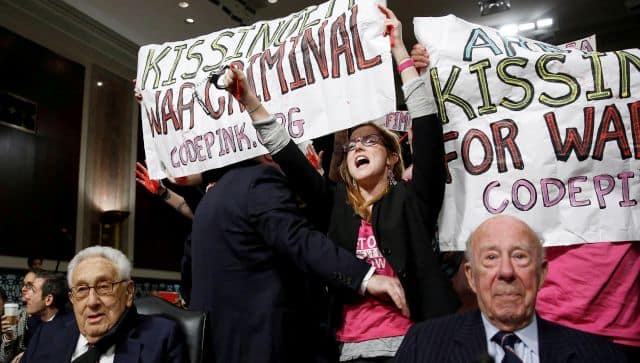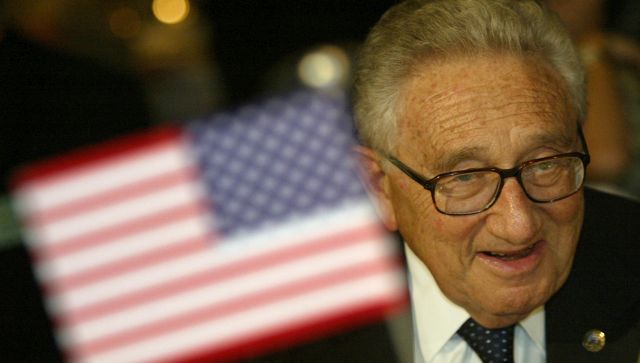Henry Kissinger has died at 100. It is a name that kept cropping up in geopolitics for decades now. An American statecraft and diplomacy giant, he served under two presidents – Richard Nixon and Gerald Ford. He heavily influenced the US foreign policy and will go down in his history as arguably the country’s most famous yet controversial diplomat.
Kissinger , who was active even after turning 100, had a lasting impact on
world affairs . He was cold and calculated. He was a divisive figure – a man who won
the Nobel Peace Prize and was considered a war-monger, even a war criminal, by others. And he had a rather complicated relationship with India. The diplomat first served as the national security adviser and then as secretary of state. During the 1970s as the US intervened in world affairs, he led from the front, impacting events in Asia. Like his boss Nixon, Kissinger was not fond of India. In fact, the duo disliked India and its then-prime minister Indira Gandhi and made no qualms about it. Two sets of declassified documents reveal the shocking bigotry and racism towards Indians and sexism towards its leader. The 2020 tapes, published in The New York Times, were accessed by professor and author Gary J Bass. “As Americans grapple with problems of racism and power, a newly declassified trove of White House tapes provides startling evidence of the bigotry voiced by President Richard M Nixon and Henry Kissinger, his national security adviser”, Bass, professor at Princeton, wrote in an opinion piece ‘The Terrible Cost of Presidential Racism’ in The New York Times (NYT). Here’s a look at what Kissinger said about India and how in recent years, he advocated for the country. Also read: The 1971 war: When Richard Nixon and Henry Kissinger failed to 'scare off' the Indians When Henry Kissinger sided with Pakistan India’s unfortunate tryst with Kissenger started in the 1970s when a crisis was unfolding in East Pakistan (now Bangladesh). After Sheikh Mujibur Rahman’s Awami League scored a landslide victory in the Pakistan elections, the country’s politicians and influential military, most from Punjab in the West, were left rattled. The rise in Bengali nationalism worried them and they stopped the inauguration of the new assembly, leading to civil unrest. On 25 March 1971, the Pakistan military launched a crackdown on the Bengali nationalist movement in East Pakistan called Operation Searchlight, killing anywhere between 300,000 to three million civilians. At least 10 million refugees fled to India. Pakistan was a key ally of the US during the Cold War. This was a time when India aligned itself with the Soviet Union. Also read: Henry Kissinger dies at 100: The moments that define his controversial legacy As the atrocities continued in East Pakistan, its consul general in Dhaka, Archer Blood asked Washington to intervene. He was met with a “deafening silence”. The US continued to supply aid to the conflict-hit nation, which prompted Blood to write a dissent memo, according to a report in The Indian Express. “Our government has failed to denounce the suppression of democracy… Our government has failed to take forceful measures to protect its citizens while at the same time bending over backwards to placate the West Pak dominated government and to lessen any deservedly negative international public relations impact against them,” he wrote in the telegram, the report says. Blood was recalled by the US. [caption id=“attachment_13448782” align=“alignnone” width=“640”] India won the 1971 war which led to the liberation of Bangladesh. During the conflict, the US sided with Pakistan. Wikimedia Commons[/caption] As refugees entered India, the country went to war with Pakistan in
December 1971 . A day after Bangladesh was liberated from Pakistan on 16 December 1971, Kissinger told Nixon that he had managed to “save West Pakistan”, according to confidential papers since declassified by the US department of state. “Congratulations Mr President. You saved West Pakistan,” said Kissinger over the phone about 16 hours after Gen AAK Niazi signed the surrender of East Pakistan and about the time Gandhi declared the unilateral ceasefire on the Western front. Explaining the strange conversation, Ambassador Pinak R Chakravarty, former High Commissioner to Bangladesh, who wrote a book on the 1971 liberation of Bangladesh, said, “Kissinger was playing a dubious role. Their (US administration’s) main objective was to befriend China using the Pakistanis as middlemen during the conflict months. His comments should be read as both an attempt to take credit with the Pakistanis in the face of a hopeless situation and a bid to please a difficult boss.” [caption id=“attachment_13448852” align=“alignnone” width=“640”]
Henry Kissinger (left) gestures to the audience in the East Room of the White House on 22 September 1973, as President Richard Nixon watches, in Washington. Both Kissinger and Nixon berated Indira Gandhi and demeaned Indians, according to classified documents now made public. File photo/AP[/caption] Berating Indira Gandhi, Indians A month before India intervened in Pakistan, Indira Gandhi met with Nixon and Kissinger. However, they had little sympathy for India. After the meeting with the Indian prime minister, Nixon and Kissinger went on a sexist and racist tirade. The diplomat called the Indian PM a bitch, according to released transcripts from the Oval Office in 2005. “We really slobbered over the old witch,” Nixon told Kissinger after meeting with Gandhi the previous day. “While she was a bitch, we got what we wanted too,” Kissinger said. “She will not be able to go home and say that the United States didn’t give her a warm reception and therefore in despair she’s got to go to war.” Indians are “a slippery, treacherous people,” Nixon said. “The Indians are bastards anyway,” Kissinger replied. “They are the most aggressive goddamn people around.”
1971 :: President Richard Nixon and PM Indira Gandhi In White House , America pic.twitter.com/os05TQ4GcJ
— indianhistorypics (@IndiaHistorypic) November 15, 2022
Another set of classified White House tapes released in 2020 reveals an earlier meeting on 17 June 1971 when Nixon and Kissinger badmouthed India. “Undoubtedly the most unattractive women in the world are the Indian women,” said Nixon. “The most sexless, nothing, these people.” In a piece in The New York Times, Bass writes, that while Kissinger has portrayed himself as being above the racism of the Nixon White House, the tapes show “him joining in the bigotry, though the tapes cannot determine whether he truly shared the president’s prejudices or was just pandering to him.” For instance, on June 3, 1971, Kissinger was “indignant” at the Indians as the country sheltered millions of Bengali refugees who had fled the Pakistan Army. “Kissinger blamed the Indians for causing the refugee flow and then condemned Indians as a whole, as he said, ‘They are a scavenging people.” [caption id=“attachment_13448872” align=“alignnone” width=“640”] Henry Kissinger briefs reporters on 12 October 1973 at the US state department in Washington. Kissinger, the diplomat with the thick glasses and gravelly voice dominated foreign policy. File photo/AP[/caption] Kissinger’s U-turn on Indira Gandhi Years later, the diplomat changed his opinion and went on to describe Gandhi as a person of “extraordinary character” and acknowledged her determination and assertiveness in pursuing India’s goals. Regretting the use of foul language, he said that the remarks had to be seen in the context of the prevailing Cold War. In 2005, after the tapes were released, he said that he had “high regards” for Gandhi. The strong remarks were a “one-time event” and he had been a “strong supporter and promoter” of a deepening ties between India and the US. “[The foul language has] to be seen in the context of a cold war atmosphere 35 years ago, when I had paid a secret visit to China when President Nixon had not yet been there and India had made a kind of an alliance with the Soviet Union,” he told NDTV. [caption id=“attachment_13448892” align=“alignnone” width=“640”]
 Demonstrators surround former US secretaries of state Henry Kissinger and George Shultz before the beginning of the Senate Armed Services Committee on global challenges and US national security strategy on Capitol Hill in Washington on 29 January 2015. File photo/Reuters[/caption] From a hater to a fan In recent years, Kissinger softened his stance towards India. After Narendra Modi became the prime minister in 2014, he pushed for strong ties with India. During the PM’s official state visit to the US in June this year, he travelled to Washington to listen to his address at the State Department luncheon despite not being in good health. He was brought in a wheelchair to the Foggy Bottom headquarters of the department and was greeted by Eric Gracetti, US ambassador to India. In June 2018, he made a rare appearance in Washington to attend the first annual leadership summit of the US-India Strategic Partnership Forum. At the event, he said, “When I think about India, I admire their strategy.” Kissenger may have had a change of heart but in India, he will be long remembered as the man who made the most unflattering comment about its first woman prime minister.
Demonstrators surround former US secretaries of state Henry Kissinger and George Shultz before the beginning of the Senate Armed Services Committee on global challenges and US national security strategy on Capitol Hill in Washington on 29 January 2015. File photo/Reuters[/caption] From a hater to a fan In recent years, Kissinger softened his stance towards India. After Narendra Modi became the prime minister in 2014, he pushed for strong ties with India. During the PM’s official state visit to the US in June this year, he travelled to Washington to listen to his address at the State Department luncheon despite not being in good health. He was brought in a wheelchair to the Foggy Bottom headquarters of the department and was greeted by Eric Gracetti, US ambassador to India. In June 2018, he made a rare appearance in Washington to attend the first annual leadership summit of the US-India Strategic Partnership Forum. At the event, he said, “When I think about India, I admire their strategy.” Kissenger may have had a change of heart but in India, he will be long remembered as the man who made the most unflattering comment about its first woman prime minister.


)

)
)
)
)
)
)
)
)



